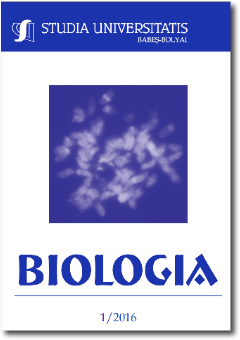Survey upon the Living Habits of Romanian but Hungarian Nationality Students Major in Biology and Physical Education
Keywords:
food pyramid, healthy nutrition, narcotics.Abstract
The present research paper had both a pedagogical type of work and also an investigative, assessing character, which was prepared with educative intention. The idea was the following: we have to know the reality concerning the lifestyle of our students, in order to decide the direction of further health education. The survey was performed by a questionnaire. The questionnaire applied for the research included 25 basic questions and further 33 questions with a segmented character. The results of the questionnaires prove that the hygienic knowledge of the students is insufficient, or they are not able to apply it properly. The majority of the interviewees feel the need to develop their hygienic knowledge. Most of the youths know the essence of health preservation, rules, but they do not apply them in practice, as they do not strive to prevention by their behavior and attitude.
Summarizing the ideas formulated in the present research paper, it is evident that the importance of health education has increased. The knowledge of the youths broaden during their high school and university studies, but these classes are insufficient. In the future it is essential to initiate modifications concerning the whole society on a higher level and united in order to change the health condition of society in the short run.
References
Alberti, K.G, Zimmet, P., Shaw, J. (2007) International Diabetes Federation: a consensus on Type 2 diabetes prevention, Diabet Med., 24, 451-463
Ashrafian, H., Ahmed, K., Simon, P.R., Patel, V.M., Nigel J. Gooderham, N.J., Holmes, E., Darzi, A., Athanasiou, T. (2011), Metabolic surgery and cancer, Cancer, 117, 1788– 99
Ayliffe, B., Glanville, N.T. (2010) Achieving healthy body weight in teenagers: evidence-based practice guidelines for community nutrition interventions, Can. J. Diet. Pract. Res., 71(4), 78-86
Bash, C.E. (2011) Physical Activity and the Achievement Gap Among Urban Minority Youth, J. Sch. Health, 81(10), 626-634
Chang, S.C., Ziegler, R.G., Dunn, B., Stolzenberg-Solomon, R., Lacey, J.V., Huang, W.Y., Schatzkin, A., Reding, D., Hoover, R.N., Hartge, P., Leitzmann, M.F. (2006) Association an energy intake and energy balance with postmenopausal breast cancer in the prostate, lung, colorectal and ovarian cancer screening trial, Cancer Epid. Biom., 15(2), 334-341
Dahiru, T., Jibo, A., Hassan, A.A., Mande, A.T. (2008) Prevalence of diabetes in a semi-urban community in northern Nigeria, Nig. J. Med., 17(4), 414-416
de Greef, L., Hartman, E., Millender-Wijnsma, M.J., Bosker, R.J., Doolaard, S., Visscher, C. (2016) Effect of physically active academic lessons on body mass index and physical fitness in primary school children, J. Sch. Health, 86(5), 342-356
Fair, A.M., Montogemy, K. (2009) Energy balance, physical activity, and cancer risk, Methods Mol. Biol., 472, 57-88
Flynn, M.A., McNeil, D.A, Maloff, B., Mutasingwa, D., Wu, M., Ford, C., Tough, S.C. (2006) Reducing obesity and related chronic disease risk in children and youth: a synthesis of evidence with 'best practice' recommendations, Obes Rev., 7 Suppl 1, 7-66
Halmi, L. (2008) Túlsúlyos világunk kapcsolatai – összefügghet történelmileg a genetika és a vásárlás? Élelmiszer, táplálkozás és marketing, 5(2-3), 25-27.
Horváth, P., (2003) Táplálkozástan, Ed. Képzőművészeti, Budapest
Kis, E., Kelemen, B., Székely, G. (2015) Human Papilloma Virus infection and cervical cancer in Romania, Studia UBB Biologia, 60(1), 155-164
Koponen, A., Sandell, M., Salminen, S., Lenoir-Wijnkoop, I. (2012) Nutrition economics: towards comprehensive understanding of the benefits of nutrition, Microbial ecology in health and diseases, 23, 46-50
Lyssenko, V., Jonsson, A., Almgren, P., Pulizzi, N., Isomaa, B., Tuomi, T. (2008) Clinical risk factors, DNA variants, and the development of type 2 diabetes, N. Engl. J. Med., 359, 2220-2232
Mahfouz, E.M., Kamal, N.N., Mohammed, E.S. (2015) Quantifying diabetes risk and identifying contributing factors among middle aged females in Minia district, Egypt, Intern. J. Healthcare Science, (3)2, 643-652
Reilly, J.J., McDowell, Z.C. (2003) Physical activity interventions in the prevention and treatment of paediatric obesity: systematic review and critical appraisal, Proc. Nutr. Soc., 62(3), 611-619
Roberts, D.L., Dive, C., Renehan, A.G. (2010) Biological mechanisms linking obesity and cancer risk: new perspectives, Annu. Rev. Med., 61, 301-316
Rydin, Y. (2012) Governing for sustainable urban development, Earthscan, London
Sladek, R., Rocheleau, G., Rung, J., Dina, C., Shen, L., Serre, D. (2007) A genome-wide association study identifies novel risk loci for type 2 diabetes, Nature, 445, 881-885
Stamatakis, E., Hamer, M., Primatesta, P. (2009) Cardiovascular medication, physical activity and mortality: cross-sectional population study with ongoing mortality follow up, Hart, 95, 448-453
Szakály, Z., Pető, K., Soós, M., Szente, V. (2013) Az életstílus hatása a egészségmagatartás és a funkcionális élelmiszerek fogyasztására, Élelmiszer, táplálkozás és marketing 9(1), 3-12
Vanczák, E., Takácsné, G.K., Komáromi, N. (2004) A gyümölcs- és almafogyasztás helyzete: egy kérdőíves felmérés eredményei, Kertgazdaság, 34(2) 55-60
Wild, S., Roglic, G., Green, A., Sicree, R., King, H. (2004) Global prevalence of diabetes: Estimates for the year 2000 and projections for 2030, Diabetes Care, 27, 1047 –1053
Wolin, K.Y., Carson, K., Colditz, G.A. (2010) Obesity and cancer, Oncologist, 15(6), 556-565
Wura, L., Goodson, P., Barry, A.E., Mcleroy, K. (2016) The role of gender in adolescents’ social networks and alcohol, tabacco and drug use: A systemic review, J. Sch. Health, 86(5), 309-321
*** http://www.cnpp.usda.gov/sites/default/files/archived_projects/FGPPamphlet. pdf
** (2005) Demography: Analysis and synthesis, Four volume set: A treatise in population, Academic Press
Downloads
Published
How to Cite
Issue
Section
License
Copyright (c) 2016 Studia Universitatis Babeș-Bolyai Biologia

This work is licensed under a Creative Commons Attribution-NonCommercial-NoDerivatives 4.0 International License.





